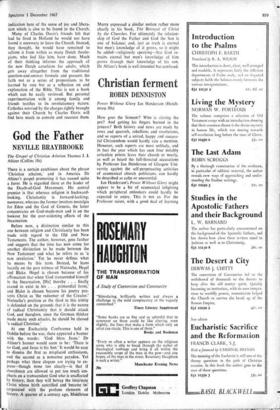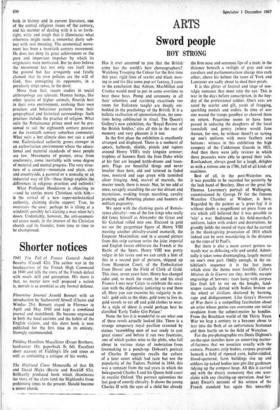Christian ferment
ROBIN DENNISTON
How goes the ferment? Who is stirring the pot? And getting his fingers burned in the process? Both history and news are made by rows and quarrels, rebellions and revolutions, and so reports of a united, happy and success- ful Christendom would hardly rate a mention. However, such reports are most unlikely, and in fact the year which has seen four notably articulate priests leave their church or nearly, as well as heard the full-throated accusations by Professor Ian Henderson of Glasgow Uni- versity against the self-perpetuating activities of ecumenical church politicians, can hardly bedescribed as calm or uneventful.
Ian Henderson's Power Without Glory might appear to be a bit of ecumenical infighting which peripheral onlookers could hardly be expected to enjoy. This is not so. For the Professor raises, with a good deal of learning
both in history and in current literature, one of the central religious issues of the' century, and his manner of dealing with it is so forth- right, witty and tough that it illuminates what otherwise might seem a somewhat dusty sub- ject with real meaning. The ecumenical move- ment has been a twentieth century movement. He does not deny its great achievement or the pure and important impulses by which its originators were motivated. But he does believe the movement has not only run itself into the ground but has arrogantly and fatally claimed that its own policies are the will of God, thus consigning its opponents, in a peculiarly strict sense, to the devil.
More than that, recent studies in social anthropology are relevant. Human beings, like other species of higher animals, flourish best in their own environment, evolving their own practices and behaviour patterns from their geographical and historical surroundings. Such pfactices include the practice of religion. What suits the Renaissance prince need not be pre- sumed to suit the eighteenth century peasant or the twentieth century suburban commuter. What suits a hot climate does not suit a cold one. Ecclesiastical authority grows stronger in an authoritarian environment where the educa-: tional and material standards of most people are low. Movements of protest, away from conformity, come inevitably with some degree of material and mental progress. The very struc- ture of a country—mountain and plain, city and countryside, a pastoral or a nomadic or an industrial way of life--these things explain the differences in religious practices and outlooks.'
What Professor Henderson is . objecting to —and he carries many Christians with
is the arrival of a new super-eCelesiasucal. authority, claiming divine support. True, he overstates the case: perhaps he is tilting at a windmill; possibly he's kicking a man when he's down. Undeniably, however, the anti-ecumeni- cal cause needs, in the interest of the Christian church and its founder, from time to time to be championed.



































 Previous page
Previous page